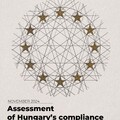Or not? The Court of Justice of the European Union has given green light to the Commission’s Rule of Law conditionality mechanism: the misuse of EU funds could soon have more severe consequences. The Luxembourg court's ruling comes after Hungary, criticized for systemic corruption, and Poland, whose judicial independence is under threat, asked the CJEU to annul the Regulation on the conditionality system for protecting the EU budget, saying the EU had no right to adopt it. The judgment was not a surprize in the light of Advocate General Campos Sánchez-Bordona's opinion last December.
The examples of Hungary and Poland have shown the EU is not able to provide an effective response to situations where certain member states deliberately weaken the rule of law or fail to protect the financial interests of the Community.

MTI/Miniszterelnöki Sajtóiroda/Benko Vivien Cher
In summer 2020, the European Council decided that the EU's financial interests must be protected in line with the values enshrined in the EU’s treaties, in particular the values of freedom, democracy, equality, the rule of law and human rights, as set out in Article 2 of TEU. In this spirit, in December 2020, the Council and Parliament adopted a regulation ‘on a general regime of conditionality for the protection of the Union budget,’ which empowers the EU to suspend EU funds in case of a breach of the rule of law.
The Regulation defines what is meant by the rule of law. It includes, for example, a transparent, accountable, democratic and pluralist law-making process, legal certainty, the prohibition of arbitrariness in the executive, independent and impartial courts, and separation of powers.
However, the Regulation does not cover all rule of law related issues but only three groups of problems: Independence of the judiciary, effective remedies and arbitrary or unlawful decisions by public authorities. For the EU to act, a breach of the rule of law must directly affect the sound financial management of the EU budget or the protection of the EU's financial interests. Action can be taken even if there is only a risk of these but the risk must be serious. Among these fields covered by the Regulation, the law specifically mentions, for example, the functioning of the authorities responsible for implementing the EU budget, public procurement and grant procedures, and the investigative authorities and prosecution.
If the Commission intends to take action under the Regulation, the notification sent to Hungary will have to specify the facts and grounds on which it considers that the procedure is justified. Based on the Regulation, the Commission will have the explicit possibility to request information from the member state, EU bodies (such as OLAF or the European Public Prosecutor's Office), as well as international and other organizations.
This power to request information will enhance the work of the press and anti-corruption NGOs working in member states, as documenting the misuse of EU funds could finally lead to legal consequences even if national authorities fail to act against corruption.
How Can the Rule of Law and the Financial Interests of the EU be Affected at the Same Time?
Although the Regulation applies from 1 January 2021 and for the budget 2021-2027, payments due in the second half of 2022 might be the first ones to be effectively concerned by the new law.
1) Agricultural Subsidies
It is not a popular topic in the news, but farm subsidies are still a significant share of the EU’s budget. K-Monitor has been monitoring the use of EU funds in Hungarian agriculture for a decade. The data collected since 2012 shows that a clearly identifiable proportion of subsidies goes to government-close businesses. An important antecedent of this was the corrupt privatization of state farms and vast land holdings, which enabled the diversion of EU funds, especially SAPS payments to cronies. At the same time, the way in which agro tenders are awarded, or the lack of any meaningful control over their use, is a constant means of channeling EU funds into pockets of business with good relations to the government.
2) Impunity in High Level Corruption Cases
The prosecution service headed by the Prosecutor General Péter Polt has been criticized for years for failing to take adequate action against high-level corruption cases. Regardless of the investigation launched in the recent Völner case, it can be seen that the highly centralized prosecution service can and indeed it does block the real investigation of politically sensitive cases. The Elios case, in which the prime minister's son-in-law's company won a series of procurements by municipalities to modernize public lighting, was left without consequence because of the prosecution’s omissions. Despite the OLAF's finding that EU funds had been misused, the PG's office remained largely inactive. Cases like this could become a reason for rule of law proceedings.
3) The Hungarian Government and EU Funds Management
Under the current system, the implementation and monitoring of the Recovery and Resilience Plan and the programmes for the next EU programming period will be carried out by highly centralized, government departments. In this system, there is no independent control of the money coming from the EU.
4) Public Procurements
The European Council has formulated concerns about the Hungarian public procurement system in a recommendation to Hungary in 2020. The recommendation highlighted the lack of competition, the high share of single-bidding at tenders and that ‘the Commission's audit of public procurement related to projects co-funded by the Union and carried out in recent years identified systemic deficiencies and showed weaknesses in the public procurement control system.’
But even before that public procurement related issues have been regularly on the agenda. A 2017 EU audit found that legal checks on procurement were not working properly, and the European Commission found serious problems in a significant number of tenders it examined. The purchases under scrutiny covered only a fraction of the public procurement market, but the huge volume of these purchases still meant that Hungary had to pay record fines (corrections). Reports by the media and NGOs have shown that government contacts increase the chances of success in tenders, while the Hungarian Competition Authority responsible for ensuring fair competition, and the Public Procurement Authority responsible for the legality of public procurements, have been less active.
5) Prominents of Public Interest Trusts
The outsourcing of higher education and university assets to public interest trusts (PIT) could easily become an EU matter if higher education institutions become beneficiaries of EU funds, for example, to renovate a university building or even for EU-funded curriculum reform or research. The special legal status of PITs will likely give rise to controversy, for example in relation to public procurements: although PITs behind the universities perform public duties and receive transfers from the state budget, thus should conduct public procurements, they are at the same time private law entities.
Fact is that PITs do not meet the basic requirements of freedom of information as they did not meet their obligation to proactively publish a variety of data on their operations on their website. Furthermore,the only way for the government to find enough loyal board members was to abolish a number of conflict of interest rules set out in law on MPs and members of the government.
Previously, the rules on economic interests were permissive, but since last year, one can be a member of government, a MP and member of the board of trustees. K-Monitor has also turned to the Hungarian Constitutional Court arguing that the abolition of the conflict of interest rules poses both a risk of corruption and a threat to the separation of powers doctrine.
What's Next?
Despite the fact that the Regulation has been in force for more than a year, the Commission, in a compromise (the debate on the Hungarian and Polish budget vetoes), committed itself not only to await the CJEU's judgment before launching the mechanism, but also to issue, in consultation with the member states, so-called ‘guidelines,’ in which it will set out how to apply the mechanism.
However, it is important to note that the Commission has not been obliged to wait for rulings or issue guidelines. This is why the European Parliament launched an action against the Commission in 2021, since it can seriously undermine trust in the EU legal system itself if binding legislation can be overridden by political deals.
Therefore, it can be expected that the debate on the rule of law mechanism will once again become a political issue, rather than a matter of getting the procedure under way as soon as possible. Since some MEPs and civil society organizations already want to see the relatively lengthy procedures formally launched after a 14-month forced break, it is still questionable whether the Commission is determined enough to enforce the new mechanism.
The fact that drafting the guidelines further prolongs the application of the tool and that they likely narrow the scope of the Regulation may suggest the opposite. Only in the light of its application will it become clear whether the adoption of the rule of law mechanism has indeed added a valuable instrument to the EU's toolbox, capable of dealing effectively and relatively quickly with mechanisms that were established to enable fraud and corruption when it comes to the spending of EU tax payers money.
K-Monitor strives against corruption and promotes the transparency of public spending in Hungary. Support Us!
Címkék: english EU conditionality
Szólj hozzá!
A bejegyzés trackback címe:
Kommentek:
A hozzászólások a vonatkozó jogszabályok értelmében felhasználói tartalomnak minősülnek, értük a szolgáltatás technikai üzemeltetője semmilyen felelősséget nem vállal, azokat nem ellenőrzi. Kifogás esetén forduljon a blog szerkesztőjéhez. Részletek a Felhasználási feltételekben és az adatvédelmi tájékoztatóban.





